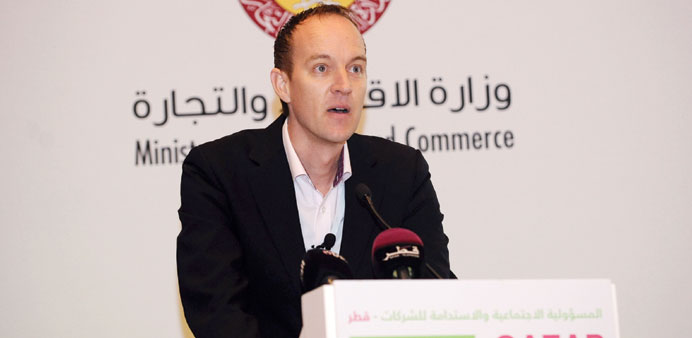By Peter Alagos/Business Reporter
Organisations in Qatar’s private sector have been shifting their corporate social responsibility (CSR) programmes away from corporate philanthropy to long-term strategies that focus on sustainable development, an industry expert has said.
Views Unlimited managing director Bart Burghgraef, who opened CSR Qatar 2015 Summit yesterday at the Hilton Hotel in Doha, noted that many companies are now aware of the effects of climate change and have shifted the focus of their CSR programmes towards sustainable development.
According to Burghgraef, atmospheric carbon dioxide (CO2) concentration rose from 300 parts per million (ppm) to more than 400 ppm, causing unprecedented extreme weather events.
Citing a research released by MIT, Burghgraef said by 2100 “it will likely be too hot for humans to live in the GCC, and that is just 85 years away.”
He added: “Qatar has one of the world’s highest waste production per capita with almost 2kg per day. In this respect, the National Development Strategy 2011-2016’s target is to increase recycling from 8% to 25% by next year.
“In the private sector, a fast growing number of organisations are moving away from the concept of corporate philanthropy to long-term sustainable strategies.”
Burghgraef also said fast changing weather patterns have exposed western countries to the ill effects of climate change.
“If you grow in an environment of abundance and everything appears safe and solid, the sense of urgency to change things is, obviously, less. A lot of western countries have been exposed to fast changing weather patterns so we have to adjust and we know that one of the reasons is directly related to human activity,” Burghgraef said.
He said this was backed up by 97% of the world’s best scientists, who said that carbon emissions that have inherently disturbed weather patterns were caused by human activity.
While there is “a very strong sense of urgency to change,” Burghgraef lamented that environmental agenda of world leaders only revolve around the short-term.
“With the upcoming COP21 in Paris, there are so many short-term interests of country leaders and politicians that are in power for four to five years so their agenda focuses on the short-term. But what we need is to plan for the long-term even if the people that lead that transition may not get political benefit from that,” Burghgraef pointed out.
Asked if the shift from corporate philanthropy to sustainable development is felt in Qatar, Burghgraef said Qatari authorities “very well understand” the need to diversify the economy.
“They are actually doing that by moving away from the oil and gas revenues … they need to diversify in order to sustain their own economics. Whether it’s 50 or 100 years from now, those resources would be depleted so you’ve got to organise things differently,” he said.
He added: “Again, the challenge is that leaders need to encourage people to support sustainable CSR programmes, and to do that requires a lot of dialogue and conversation.
“This forum is just one of the small contributions to boost awareness among people that charity is great; it is a great human attitude to look after your people, but we have to put at the back of our minds the sense of urgency that charity alone is not going to save humanity in the next hundred years.”

Views Unlimited managing director Bart Burghgraef.
